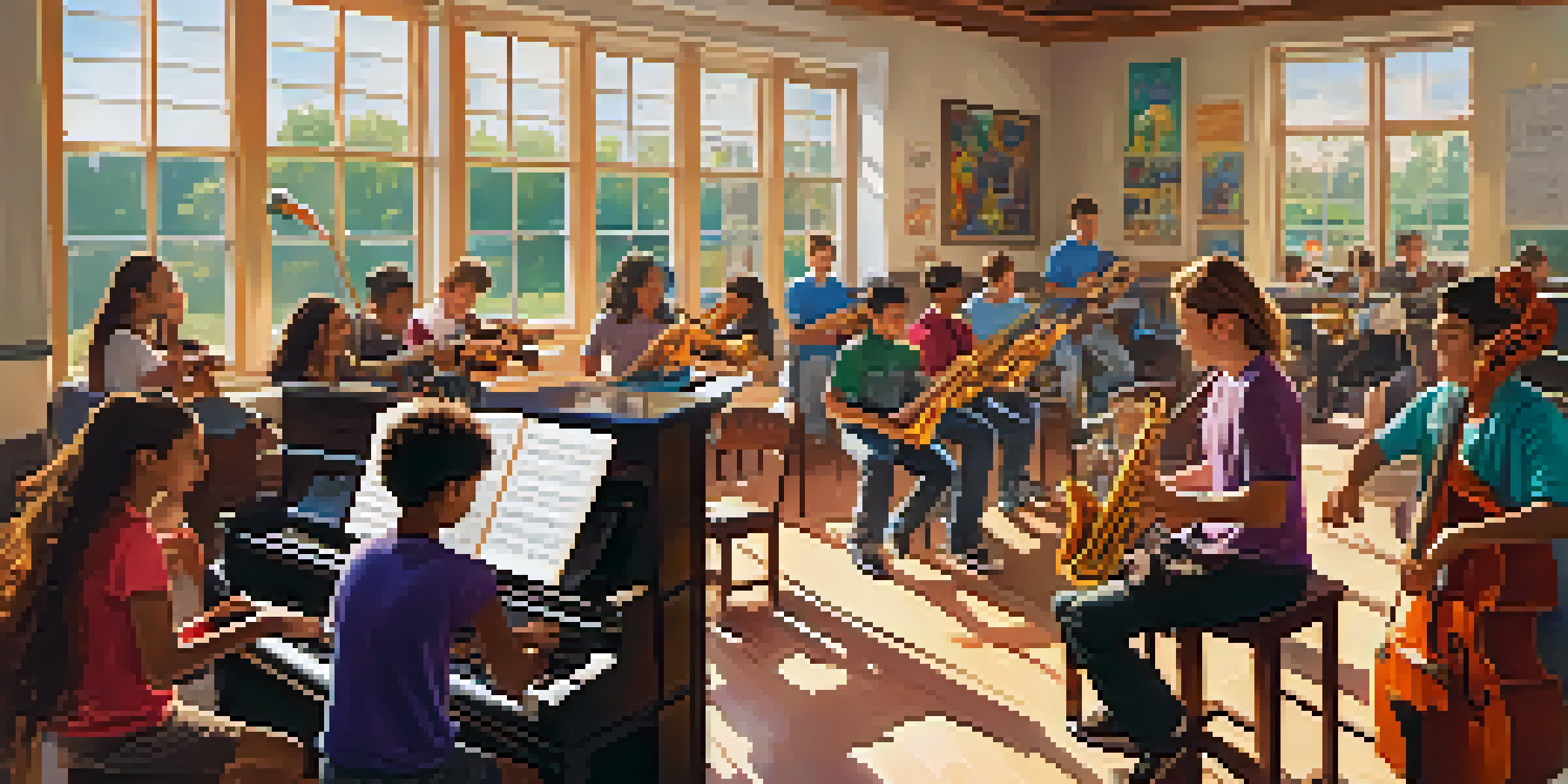Developing Leadership Skills Through Music Education Programs

Understanding Leadership Skills in Music Education
Leadership skills are essential in various aspects of life, and music education provides a unique platform for developing them. In music classes, students often take on roles that require them to lead their peers, whether in group performances or collaborative projects. This hands-on experience not only enhances their musical abilities but also cultivates confidence and responsibility.
Music can change the world because it can change people.
For instance, when students participate in band or choir, they may have the opportunity to be section leaders. This position encourages them to guide others, make decisions, and communicate effectively, all of which are vital leadership traits. These experiences help students realize their potential as leaders in both music and beyond.
Moreover, music education promotes a sense of accountability, as students learn to rely on each other to achieve a common goal. This teamwork fosters trust and respect, essential ingredients for any effective leader. By navigating these collaborative environments, students naturally strengthen their leadership skills.
Cultivating Communication Skills Through Music
Effective communication is at the heart of good leadership, and music education can significantly enhance this skill. When students learn to play an instrument or sing, they must listen carefully to their peers and respond accordingly. This dynamic interaction, whether in a rehearsal or performance, sharpens their ability to convey ideas clearly and succinctly.

Additionally, music education often requires students to articulate their thoughts and feelings about the music they create or perform. Engaging in discussions about interpretation, dynamics, and emotional expression encourages them to practice verbal communication in a supportive environment. This experience is invaluable, as strong communicators are often seen as natural leaders.
Leadership Skills Through Music
Music education cultivates essential leadership skills such as confidence, responsibility, and accountability among students.
Furthermore, performing in front of an audience helps students overcome stage fright and build confidence in their public speaking abilities. As they learn to share their musical stories, they also develop the poise and assurance that come with effective leadership. These skills are transferable to various contexts, from school presentations to professional settings.
Enhancing Problem-Solving Skills in Musical Settings
Music often presents challenges that require quick thinking and problem-solving, crucial attributes for any leader. In a rehearsal, musicians may encounter unexpected issues, such as a missed note or an imbalance in sound. Tackling these obstacles fosters creativity and resourcefulness, essential traits for effective leadership.
The beautiful thing about learning is that no one can take it away from you.
For example, when a conductor needs to adjust the tempo or dynamics due to unforeseen circumstances, they must think on their feet and communicate changes clearly to the ensemble. This scenario not only illustrates the importance of adaptability but also demonstrates how leaders must navigate challenges with grace and clarity.
Moreover, students learn to analyze situations critically, weighing the pros and cons of different approaches. This analytical mindset translates well into real-world leadership scenarios, enabling them to make informed decisions under pressure. As they become adept at solving musical problems, they also develop the confidence to tackle complex issues in their personal and professional lives.
Fostering Teamwork and Collaboration in Music
Teamwork is crucial in both music and leadership, and music education provides ample opportunities for students to develop this skill. Whether in orchestras, bands, or choirs, students learn that their contributions are vital to the overall success of the group. This understanding cultivates a sense of belonging and commitment to shared goals.
As students work together to achieve musical harmony, they also practice collaborating with diverse personalities and perspectives. This exposure teaches them to navigate differences and find common ground, essential skills for any leader. They learn that great leaders value input from all team members, fostering an inclusive environment.
Communication Enhancement via Music
Participating in music education fosters effective communication skills, as students learn to articulate their thoughts and collaborate with peers.
Moreover, successful collaborations in music often lead to deeper bonds among students. These relationships can enhance their leadership abilities, as they learn to inspire and motivate their peers. By experiencing the power of teamwork firsthand, students are better prepared to lead diverse groups in various contexts.
Building Resilience Through Musical Challenges
Resilience is a key leadership trait, and music education often tests students' perseverance. Learning to play an instrument or perform in front of an audience can be daunting, but overcoming these challenges builds character and determination. Each practice session or performance offers valuable lessons in persistence.
For instance, when students face difficulties mastering a piece of music, they learn the importance of patience and hard work. They discover that failure is not the end but rather a stepping stone toward improvement. This mindset is crucial for leaders, who must often navigate setbacks while maintaining their vision.
Furthermore, the supportive environment of music education encourages students to take risks without fear of judgment. This freedom to experiment helps them develop resilience, as they learn to bounce back from mistakes. Ultimately, this ability to recover from challenges is what sets effective leaders apart.
Encouraging Creativity and Innovation in Leadership
Creativity is an essential component of effective leadership, and music education nurtures this skill in students. As they explore different musical styles and compositions, students are encouraged to think outside the box and express themselves uniquely. This creative exploration fosters innovation, a valuable trait for any leader.
When students are given the freedom to compose their own music or reinterpret existing works, they learn to trust their instincts and embrace their individuality. This process not only enhances their artistic abilities but also encourages them to take ownership of their ideas. Creative leaders are often seen as visionaries who inspire others to think differently.
Resilience Built Through Musical Challenges
Overcoming challenges in music education teaches students resilience, a key trait for effective leadership in various life situations.
Moreover, the collaborative nature of music education allows students to share their creative ideas with peers, further enhancing their leadership skills. By participating in group projects or performances, they learn to appreciate diverse perspectives and incorporate them into their work. This spirit of collaboration fosters an innovative mindset that will serve them well in their future endeavors.
The Lasting Impact of Music Education on Future Leaders
The skills acquired through music education extend far beyond the classroom, shaping students into well-rounded individuals and future leaders. As they cultivate communication, teamwork, resilience, and creativity, they become equipped to tackle challenges in various spheres of life. These experiences lay a strong foundation for their personal and professional journeys.
Moreover, students who engage in music education often develop a lifelong appreciation for the arts. This appreciation can lead to a commitment to fostering creativity and innovation in their communities as future leaders. They are more likely to champion the arts and advocate for programs that encourage artistic expression.

Ultimately, the leadership skills honed through music education create a ripple effect, benefiting not only the students but also their peers and communities. As these young leaders emerge, they carry with them the values of collaboration, creativity, and resilience, enriching the world around them.